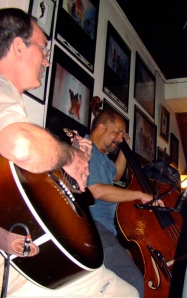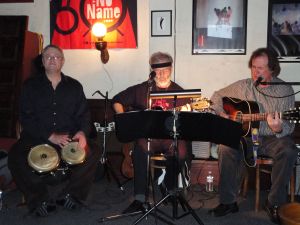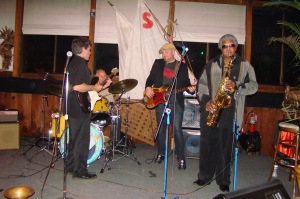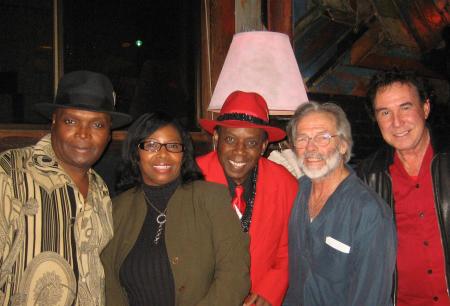Mal Sharpe is anAmerican television and radio personality who also leads a Dixieland jazz band in the Bay Area. According to Wikipedia, “In the early 1960s, Sharpe teamed with Jim Coyle to create a series of comic on-the-street interviews for San Francisco radio station KGO. Armed with a tape recorder, Coyle and Sharpe confronted pedestrians with unusual questions or strange behavior. In a 1964 interview with Newsweek magazine, Sharpe explained “We try to pose an almost plausible question, then proceed step by step into absurdity until the interviewee is seething.”

Big Money In Jazz: L-R Jeff Sanford, Leon Oakley, Bill Dekuiper, Mal Sharpe, Joe Mckinley and Carmen Consino
Mal Sharpe’s Big Money In Jazz Band has been playing at the No Name Bar in Sausalito, CA every Sunday afternoon since about 1990. Listening to them is an authentic trip down yesteryear. It’s like going back to the roaring twenties to a time before any of us were born (including Mal Sharpe) to an era of good times and no worries.
Mal sings some songs you may never have heard of, but they really swing. He belts out Goin Back To Indiana, then gives it the trombone treatment as only he can do. With the clarinet, coronet and trombone weaving an intricate melodic web, it’s New Orleans in Sausalito. That Clarinet is played by Jeff Sanford who doubles on saxophone. Sharpe takes turns with Sanford on solos with equal time given to Leon Oakley on coronet.
The sound is rounded out with a solid rhythm section consisting of Carmen Consino on drums and Joe Mckinley on Bass. Chords are laid down on guitar by Bill Dekuiper.
After a few songs they are all joined by Faith Winthrop on vocals for her rendition of Cheek To Cheek, the Irving Berlin classic. She sings with a well trained voice that is dripping with sweet inflections of the Jazz Age. Following this is Louis Armstrong’s Someday You’ll Be Sorry in which the full impact of the band and singer adds exponentially.
Winthrop, who grew up in Boston, came to Sausalito in 1955 where she lived for a while and during which time she sang at the hungry i in San Francisco.
After wandering to Los Angeles, New York and other points east, she returned here in 1965 and married. She was a featured singer at the Razz Room for many years and has lately been appearing here regularly with Mal Sharpe’s Big Money In Jazz Band. Here’s hoping she continues here for the foreseeable future.
There is a request for Basin Street Blues which is happily obliged by Sharpe who delivers the vocal.
Everybody solos including the guitar driven by Bill Dekuiper. This is Kenny Burrell redux with a strong taste of blues.
When the drums came in, it was in four bar segments, with Consino playing four bars solo and then four bars with the band with maybe four reps.
Winthrop returned to the stage and sang Ain’t Misbehavin, the wonderful standard from Fats Waller. This song, written in 1929, is perfect for Dixieland with its drawled out melody and swing rhythm. A song called New Age Old age is next. This is a twelve bar blues that was written by Winthrop.
Winthrop continued on with Wrap Your Troubles In Dreams, written by Harry Barris, Ted Koehler, and Billy Moll but made famous by Louis Armstrong. This is an especially beautiful song and when her lovely voice gave way to the sax, it was music heaven, with new and inscrutable melodies filling the room.
Mal Sharpe took over for a few minutes with I Want A Little Girl, another song made famous by Louis Armstrong. Winthrop returned right away though with I’m Beginning To See The Light, a Duke Ellington song that was a hit for Ella Fitzgerald.
On this song, the coronet and and alto sax take fours. The rhythm section continues while Dekuiper and Oakley take turns at four bars each. It works up into a frenzy when they change it to two bars. They all come in climatically and then fall off as the voice comes back in. Dramatic!
At this point, Tao Jones, a regular performer at the No Name Bar, shows up and sings Just A Little While To Stay Here, a gospel favorite of unknown provenance.
With a strong baritone voice, he leads the band into some new territory and it starts to rock. At least that’s what the audience was doing.
At The Jazz Band Ball, a fast tune by Louis armstrong, is played with hot instrumentals and drum breaks. The drum breaks aren’t just fours, but actual solos this time around.
Winthrop comes back and sings Georgia, with a false start and a key change. After changing from Eb to Bb, it comes off beautifully with a super solo on soprano sax as well as trombone.
She gives us one more with A Hundred Years From Today, a song written by Victor Young, the lyrics by Ned Washington and Joe Young. The song was published in 1933. This song is about how we should enjoy life because what we do won’t matter in a hundred years, a contention that is losing favor these days.
Mal Sharpe ends the set singing The Song Has Ended, another by Irving Berlin but made famous by Ella Fitzgerald.
To learn More About Mal Sharpe go to http://www.keller.com/bass/bigmoney/
To learn more about Faith Winthrop go to http://www.faithwinthrop.com/bio.html
To learn more about the No Name Bar go to http://localmusicvibe.com/venue/no-name-bar


























































